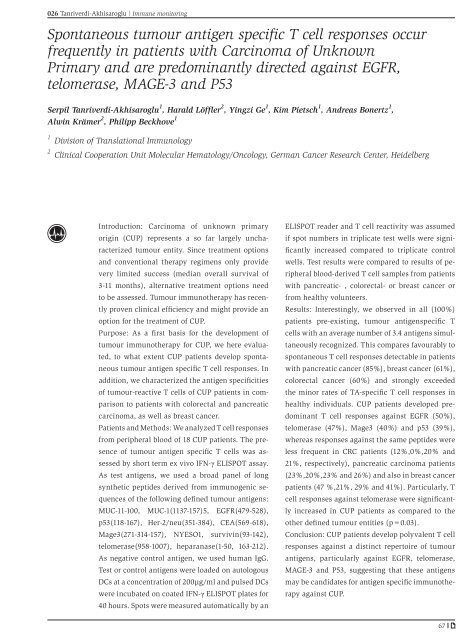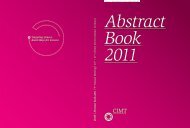Abstract Book 2010 - CIMT Annual Meeting
Abstract Book 2010 - CIMT Annual Meeting
Abstract Book 2010 - CIMT Annual Meeting
Create successful ePaper yourself
Turn your PDF publications into a flip-book with our unique Google optimized e-Paper software.
026 Tanriverdi-Akhisaroglu | Immune monitoring<br />
Spontaneous tumour antigen specific T cell responses occur<br />
frequently in patients with Carcinoma of Unknown<br />
Primary and are predominantly directed against EGFR,<br />
telomerase, MAGE-3 and P53<br />
Serpil Tanriverdi-Akhisaroglu 1 , Harald Löffler 2 , Yingzi Ge 1 , Kim Pietsch 1 , Andreas Bonertz 1 ,<br />
Alwin Krämer 2 , Philipp Beckhove 1<br />
1 Division of Translational Immunology<br />
2 Clinical Cooperation Unit Molecular Hematology/Oncology, German Cancer Research Center, Heidelberg<br />
Introduction: Carcinoma of unknown primary<br />
origin (CUP) represents a so far largely uncharacterized<br />
tumour entity. Since treatment options<br />
and conventional therapy regimens only provide<br />
very limited success (median overall survival of<br />
3-11 months), alternative treatment options need<br />
to be assessed. Tumour immunotherapy has recently<br />
proven clinical efficiency and might provide an<br />
option for the treatment of CUP.<br />
Purpose: As a first basis for the development of<br />
tumour immunotherapy for CUP, we here evaluated,<br />
to what extent CUP patients develop spontaneous<br />
tumour antigen specific T cell responses. In<br />
addition, we characterized the antigen specificities<br />
of tumour-reactive T cells of CUP patients in comparison<br />
to patients with colorectal and pancreatic<br />
carcinoma, as well as breast cancer.<br />
Patients and Methods: We analyzed T cell responses<br />
from peripheral blood of 18 CUP patients. The presence<br />
of tumour antigen specific T cells was assessed<br />
by short term ex vivo IFN-γ ELISPOT assay.<br />
As test antigens, we used a broad panel of long<br />
synthetic peptides derived from immunogenic sequences<br />
of the following defined tumour antigens:<br />
MUC-11-100, MUC-1(1137-157)5, EGFR(479-528),<br />
p53(118-167), Her-2/neu(351-384), CEA(569-618),<br />
Mage3(271-314-157), NYESO1, survivin(93-142),<br />
telomerase(958-1007), heparanase(1-50, 163-212).<br />
As negative control antigen, we used human IgG.<br />
Test or control antigens were loaded on autologous<br />
DCs at a concentration of 200µg/ml and pulsed DCs<br />
were incubated on coated IFN-γ ELISPOT plates for<br />
40 hours. Spots were measured automatically by an<br />
ELISPOT reader and T cell reactivity was assumed<br />
if spot numbers in triplicate test wells were significantly<br />
increased compared to triplicate control<br />
wells. Test results were compared to results of peripheral<br />
blood-derived T cell samples from patients<br />
with pancreatic- , colorectal- or breast cancer or<br />
from healthy volunteers.<br />
Results: Interestingly, we observed in all (100%)<br />
patients pre-existing, tumour antigenspecific T<br />
cells with an average number of 3.4 antigens simultaneously<br />
recognized. This compares favourably to<br />
spontaneous T cell responses detectable in patients<br />
with pancreatic cancer (85%), breast cancer (61%),<br />
colorectal cancer (60%) and strongly exceeded<br />
the minor rates of TA-specific T cell responses in<br />
healthy individuals. CUP patients developed predominant<br />
T cell responses against EGFR (50%),<br />
telomerase (47%), Mage3 (40%) and p53 (39%),<br />
whereas responses against the same peptides were<br />
less frequent in CRC patients (12%,0%,20% and<br />
21%, respectively), pancreatic carcinoma patients<br />
(23%,20%,23% and 26%) and also in breast cancer<br />
patients (47 %,21%, 29% and 41%). Particularly, T<br />
cell responses against telomerase were significantly<br />
increased in CUP patients as compared to the<br />
other defined tumour entities (p=0.03).<br />
Conclusion: CUP patients develop polyvalent T cell<br />
responses against a distinct repertoire of tumour<br />
antigens, particularly against EGFR, telomerase,<br />
MAGE-3 and P53, suggesting that these antigens<br />
may be candidates for antigen specific immunotherapy<br />
against CUP.<br />
67



